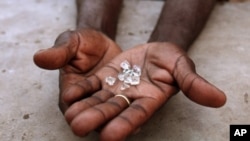The old adage that diamonds glitter seems not to apply in Zimbabwe. The economy has failed to click despite the country discovering these precious stones about eight years ago. Instead, diamond mining in Zimbabwe’s controversial Marange fields has been mainly associated with corruption and abuse - leading to a 2008 international ban on Zimbabwe exporting its diamonds. Now that the ban has been lifted, the government is trying to create an impression that all is well in Marange.
Misused resources
Zimbabwe’s diamond fields are probably the biggest diamond find of recent times, and could possibly pump up the country’s ailing economy. But so far, they've mostly generated allegations that the army has committed human rights abuses in the mining fields. Zimbabwe's government denies those accusations.
Lately, rights groups have voiced new concerns that diamond proceeds are being secretly channeled to President Robert Mugabe's ZANU-PF party to fund his re-election bid. Recently, the government sponsored a tour of Zimbabwe’s diamond fields to persuade human rights activists that mining abuses had stopped.
Kimberley Process
Shamiso Mtisi is the local Civil Society Coalition coordinator for the Kimberley Process, the international system designed to stop the export of so-called blood diamonds. He was part of the team that toured the fields.
"Unfortunately we did not meet the community specifically. We met some representatives of the community. But we wanted to meet the ordinary people in Marange. As a result we were not able to determine finer details in terms of human rights abuses in Marange. But if you are talking about access to water, relocation, you are talking about human rights as well," said Mtisi. "So within the broader framework of human rights issues, those are some of the issues we identify in terms of relocation."
Mtisi is referring to thousands of families which have been displaced by the diamond mining operations. The government and mining companies pledged to relocate the affected families. That pledge remains unfulfilled.
Transparency
This 26-year-old man, who we’ll call Richard, is a diamond panner. He believes Mugabe’s government must allow Zimbabweans to mine diamonds together with established companies.
“I think the government should make sure that people mining diamonds are mining in peace," he said. "Where the soldiers or government can take the responsibility of the people. People can mine the diamonds and give them [government], the diamonds so that they can pay them. Sort of employment. Someone needs something to do in order to make a life.”
He says soldiers and police have beaten him up but he continues sneaking into the diamond fields.
“That is where my life is," he said. "Here in town there is no employment, you cannot get a job so that you survive. You have to go there no matter how hard. It is a do-or-die for most people in Zimbabwe. I do not have anything to do. There is no way I can make life without mining diamonds.”
Unemployment
According to the U.N., Zimbabwe’s unemployment rate is above 80 percent. Many thought with the country discovering diamonds about eight years ago, the country’s woes would end. But the situation has remained dire, though the economy has slightly improved. Mtisi says the situation can improve further if there is transparency in Zimbabwe’s diamond industry.
"I think every Zimbabwean would want to see diamonds in Marange benefiting the country," he continued. "For us it is an issue of concern. It is best of Zimbabwe to know the actual totality of revenue realized from the diamonds. Once we aware of that information we will be [able to] say how is that money being distributed in electricity, water, social sectors that are lacking."
Mtisi says civil society groups want to see that money plowed into social services so that the lives of Zimbabwe's people will be improved.










